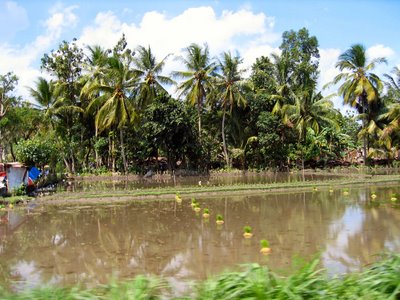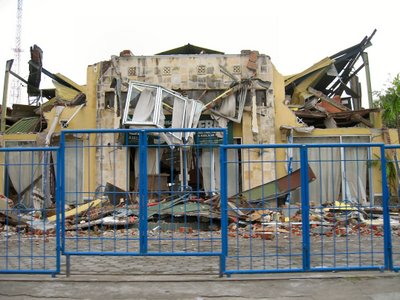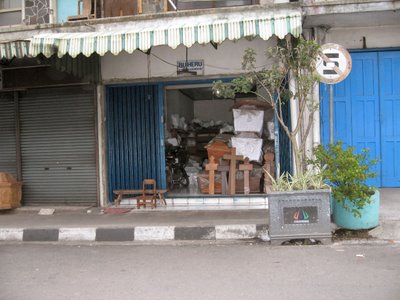I called Cahyati again and got the same response. Yuli and Emma stuffed lunch sandwiches made from the buffet into Yuli’s bag, ate breakfast and headed south. I packed up the room, checked out of the hotel, and began the wait for a taxi, present now, but rare. I ran our stuff home, then went to the site of my workshop, intent on finding Cahyati (whose name means “the light”). At the seminar site, the American Corner of Gadja Made University (UGM), Indonesia’s largest and most famous, I met the Director of Libraries as he came out of the building. We had talked several times, and he and Cahya took me out to lunch recently as thanks for a year-long teacher training seminar series I’d volunteered to do for them at their library.
He glanced up at me and did not recognize me. When I offered a salutation to his hunched back, recognition dawned. He’d returned from Singapore on Saturday via Solo (it was a holiday weekend) and found his entire family on the street. His house was badly damaged, but still there with water wells functional and safe. Cahya was far less lucky. Her phone was destroyed by the roof and walls she dodged when she and her family fled their compound in the morning. But she and her family are alive, at least! He told me there was nothing left of the house, and she had been by his two hours before looking for food. Another of the library staff had still not been located, most of the Univerisity staff lived in the same area and were in similar straits, and he was extremely concerned. I left my number and a note for Cahya, and headed to my University, not far away.
There I found my office building in far worse shape than I’d expected, and learned that the jewels of the University, the mosque and Rectorate, had been condemned. However, only one of my colleagues had experienced significant damage to self or property. My office looks like it’s been searched by the ATF, and there are ominous cracks all over the place, but other than that… I’m only guessing now that all the planning we’ve been doing and locking into place will be postponed indefinitely…
Back in the taxi, I headed home with nagging concerns about Cahya and my lack of action on the relief front. Impulsively, I told the driver to head back to the UGM library. The librarian drew me a map that would lead to Cahya’s Kampung, adjacent to the nationally famous Jogja Silver Market. He said “next to the silver market look down a narrow alley where there are no houses left. She lives there.”
I found a few kilos of rice, a carton of cookies and drinking water, and headed to the Silver Market, past a couple of empty army personnel jeeps, and on to the most depressing sites I’ve yet witnessed with my own eyes. Dust clouds everywhere. Most everything devastated and nothing completely intact. We turned right at the market and, as per the map, looked for near-total destruction across the street. Sure enough, there it was…
I stopped the taxi, got out, and began looking for people at the scene. I passed a group of soldiers focused on clearing the debris in front of one and only one relatively undamaged home. “Hello, boss,” one of them said as I worked past them. How much had the homeowner paid them to do this? Not finding anyone, I turned down an alley showing nothing but rubble, and began making my way. Eventually I came into what was now a courtyard, but what two days ago had been the entryway to two homes on opposite sides of the street. The front walls and ceilings had crumbled and been somewhat cleared. Now there were sleeping mats laid out in the sun, and bits of brick everywhere. Up a little further, in a bit of house with a roof that still offered piecemeal shelter from sun and rain, an elderly couple and two grandchildren waited out the heat.
When they saw me they smiled and rose. Using body and Bahasa Indonesia, I apologized for my intrusion and their situation, and told them who I was looking for. By there response, I knew that this was they way everybody found each other here. They ran a few similar names by me, but they didn’t match. I told them where she worked and what she did there ( I HAVE learned a bit of the language after all!). By this time several other members of their Kampung had appeared, and a younger man told me he knew some UGM people lived closer to the Market.
There were so many smiles there. How quickly these people adapt to their condition. Like Yuli said yesterday, they have so little, and are so poor! They lose their homes, which they’ve been building piece by piece for generations. They lack secure access to water and food. And yet they smile because things aren’t worse than they are. Let that be a lesson to all of us.
I headed back down towards the market, and stumbled up two more alleys, reenacting the same encounters. Eventually someone I talked to knew exactly where to find Cahya’s dwelling. I looked where he was pointing and saw nothing. I stumbled on and made a right where he’d pointed, bowing to an old, gap-toothed couple on a makeshift swing swaying in the midst of debris piles, saw a door jammed shut on two-thirds of a wall, when a voice called from behind me.
“Tom?” And there she was. She led me back a ways and I realized I’d missed her and her sister and mom in their garden, such as it was. When there houses collapsed, Cahya’s family expanded instantly to include her walled-off neighbors on three sides. Now there were 75 of them, sharing tarpaulins, one or two intact toilets (without direct water supply), and a large, brand new courtyard where there had been rooms. The working cell phone belonged to her father. I stayed a few minutes, surveyed the damage, delivered the food, got a list of what they really needed (powdered milk for the children, rice, batteries, flashlights, candles, and sugar), took some pictures. Sure would be easier to be a child. They ran around, shouted, flirted with my camera (and my buleness). Cahya smiled, though she and her family were obviously exhausted, and said, quite sincerely, “at least we are alive.” Her father waved at the truly impressive bamboo and tarpaulin shelter they had lashed together and said “we will have to live like this for one or two months.” I looked around me and was thankful that, despite the occasional rain, the dry season had only just begun. They will need most of it to re-shelter themselves indoors.
Then I headed back north, much closer to the active volcano, to where it looks like nothing has happened. To my house, which I will soon figure out to whom to offer its shelter, where the burst water pipe has been repaired, where I have just finished off a second beer while writing this entry, where I have re-filled the water tank and used my washing machine to catch up on the laundry backlog (the housekeeper, understandably, has vanished), stopping off at the KFC for victuals for Yuli and me, and at the supermarket, where I located powdered milk, rice, and sugar to go with the flashlights I’ll donate to Cahya with Yuli later today.
I’m thinking about how fortunate I am. The biggest reason Yuli and I are better off than most here is that I’m American and earn nearly 30 times the average salary here. I can take one look at a townhouse in the suburbs, cough up $2500 for the year without blinking, and know not from what I am saving myself. I too, am grateful that things are not worse than they are. And I smile. And I understand that it’s gonna be a waste of time to be angry at the forces that prevent this government from reaching Cahya with rice and milk, which aren’t very different from the ones that prevented my government from reaching all the Cahyas in New Orleans.
Yuli’s Day 3
Meanwhile, Yuli took Brit Embassy rep Emma, to the epicenter, and located most of the remaining members of Yuli’s local family, and saw still more. Among the anecdotes I’ve heard…
Her family gave her and Emma bamboo bracelets to protect them from future earthquakes. Yuli delivered our stolen hotel towels to her family, and they immediately recognized them as baby blankets for this cold wet (it is raining heavily now) night.
One of her family members is a renowned shadow-puppeteer, and he has still not been heard from by anyone. One of the pictures she took today is of a destroyed family home, flattening its gamelan orchestra and shadow puppet stage.
Saturday morning, her cousin’s baby was saved by a chest of drawers that fell across her bed, stopping propped above her, and absorbing the wall that fell next. With some struggle, they could pull the baby free, unhurt.
Family at another destroyed home fed Yuli and Emma with the best of what they had: some turnip-like roots and tea; it would not have been proper to decline the offer.
Roni’s people set Emma straight on what his community had received, what they still needed, and what neighboring communities had yet to get; his neighbors had, I suppose understandably, made their own situation out to be far worse than it currently was, dire as it may have been. Unlike their own area, nearby, doctors and tents have yet to arrive.
Looking in her eyes, I see that she is relieved to have done as much good as she could today.
 There is what remains of a becak in the middle of this photo. A bicycle-carriage, this vehicle was undoubtedly the only means of transport for the family that lived in this house, by their ricefield, some 20 KM from Jogjakarta. The man in the family must have powered it into town nearly everyday, to the tourist centers or near the better restaurants or hotels, where he waited most of the day for the one, two, or three transport jobs he would get. The he would power it back home to his wife, and/or children, and/or grandchildren with the $1, $2, or $3 dollars his calves and hamstrings had earned him. Meanwhile his wife did what was necessary at home and in the fields, of which they were certainly tenant farmers, getting 25% of the harvest every three or six months. They wee not in evidence when Yuli caught this sight -- The question is only which bit of sky are they sheltering under nearby, and how many others are with them, in the same plight?
There is what remains of a becak in the middle of this photo. A bicycle-carriage, this vehicle was undoubtedly the only means of transport for the family that lived in this house, by their ricefield, some 20 KM from Jogjakarta. The man in the family must have powered it into town nearly everyday, to the tourist centers or near the better restaurants or hotels, where he waited most of the day for the one, two, or three transport jobs he would get. The he would power it back home to his wife, and/or children, and/or grandchildren with the $1, $2, or $3 dollars his calves and hamstrings had earned him. Meanwhile his wife did what was necessary at home and in the fields, of which they were certainly tenant farmers, getting 25% of the harvest every three or six months. They wee not in evidence when Yuli caught this sight -- The question is only which bit of sky are they sheltering under nearby, and how many others are with them, in the same plight?





















